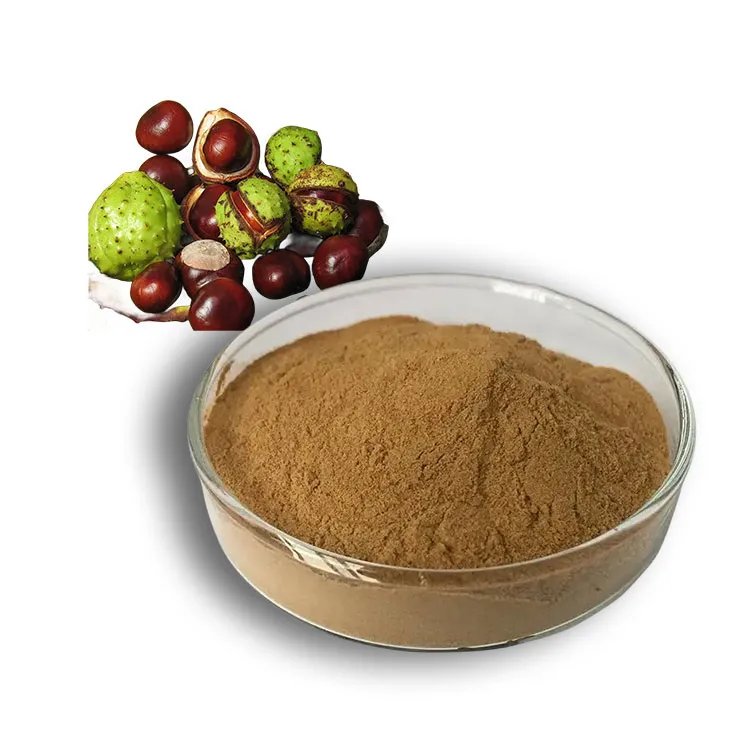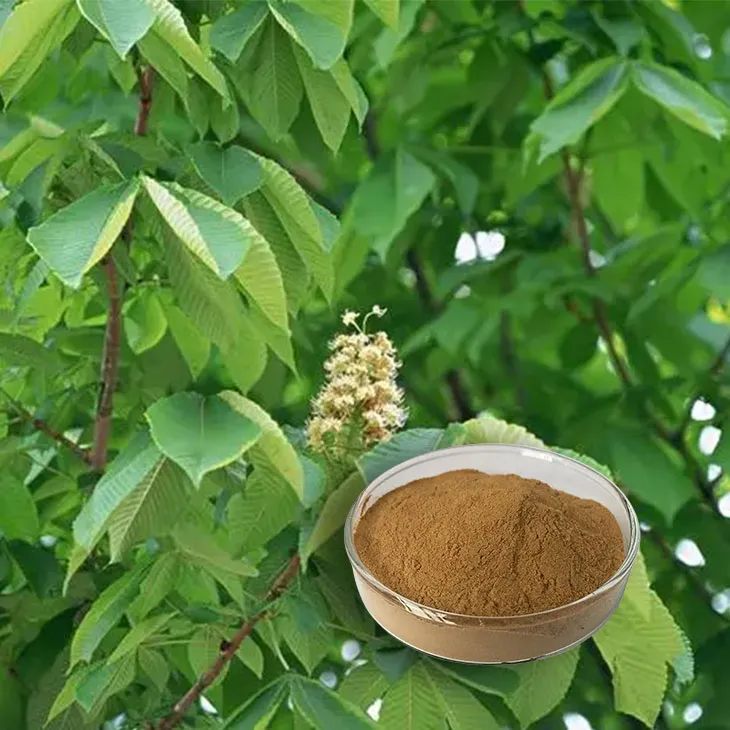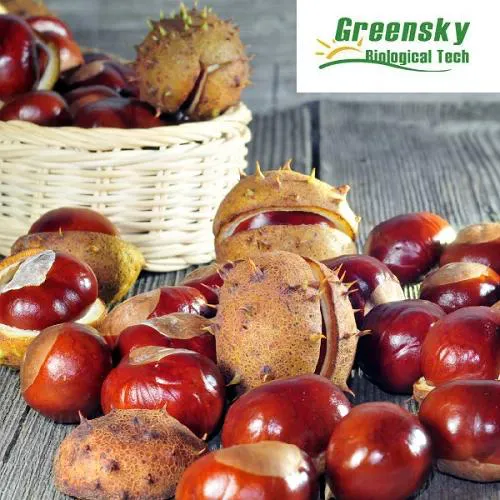- 0086-571-85302990
- sales@greenskybio.com
Suppliers of Organic Horse Chestnut Extract Powder.
2024-12-02

1. Introduction
In the realm of natural extracts, organic Horse Chestnut Extract Powder suppliers play a crucial role. As the demand for natural and organic products has been on the rise in recent years, these suppliers are at the forefront of providing a valuable ingredient that has numerous applications in various industries. Horse Chestnut Extract powder is derived from the horse chestnut tree, scientifically known as Aesculus hippocastanum. It contains active compounds such as aescin, which have been studied for their potential health benefits and other useful properties.

2. Importance of the Origin of Horse Chestnut Plants
The origin of the horse chestnut plants is of utmost importance for suppliers. Organic cultivation methods are not just a trend but a necessity to ensure the purity and safety of the extract.
2.1 Geographic Considerations
- Different regions may have varying environmental conditions that can impact the quality of the horse chestnut plants. For example, plants grown in areas with clean air, unpolluted soil, and an appropriate climate are more likely to produce high - quality raw materials for extraction. In Europe, certain regions are known for their favorable conditions for horse chestnut growth. These areas have a long history of horse chestnut cultivation, and the local knowledge and expertise contribute to the overall quality of the plants. - Some suppliers may prefer to source their horse chestnut plants from specific regions known for their organic farming practices. For instance, in parts of Germany and France, there are strict regulations regarding organic agriculture. Plants sourced from these areas are more likely to meet the high standards required for organic Horse Chestnut Extract powder production.
2.2 Organic Certification and Standards
- Suppliers must adhere to strict organic certification standards. These standards ensure that the horse chestnut plants are grown without the use of synthetic pesticides, fertilizers, or genetically modified organisms (GMOs). For example, in the United States, the USDA Organic certification is widely recognized. Suppliers who can provide products with this certification have a competitive edge in the market. - Organic certification also involves regular inspections of the farms where the horse chestnut plants are grown. This helps to maintain the integrity of the organic supply chain. Suppliers need to work closely with the farmers to ensure that all the requirements of the organic certification are met. This includes proper record - keeping of farming activities, such as the types of fertilizers used (only organic - approved ones), and pest control methods (such as biological control rather than chemical pesticides).

3. The Extraction Process and Equipment
During the extraction process, suppliers use state - of - the - art equipment to obtain high - quality organic Horse Chestnut Extract Powder.
3.1 Selection of Appropriate Extraction Methods
- There are different extraction methods available, such as solvent extraction and supercritical fluid extraction. Solvent extraction is a commonly used method, where solvents like ethanol are used to extract the active compounds from the horse chestnut seeds or bark. However, suppliers need to be careful in choosing the solvents to ensure that no harmful residues are left in the final product. Supercritical fluid extraction, on the other hand, uses substances like carbon dioxide in a supercritical state. This method has the advantage of being more environmentally friendly and can produce a purer extract. - The choice of extraction method also depends on the desired properties of the extract powder. For example, if a higher concentration of aescin is required, the extraction method may need to be optimized accordingly. Suppliers often conduct research and development to find the most suitable extraction method for their specific product requirements.
3.2 Use of Advanced Equipment
- Modern extraction equipment allows for more precise control of the extraction process. For example, advanced centrifuges can be used to separate the extract from the plant material more efficiently. High - pressure homogenizers can break down the plant cells more effectively, releasing more of the active compounds. - Automated extraction systems are also becoming popular among suppliers. These systems can ensure consistent quality of the extract powder by precisely controlling factors such as temperature, pressure, and extraction time. This is especially important when scaling up production to meet the growing market demand.

4. Production Facilities and Quality Control
Suppliers' production facilities should follow strict hygiene and quality control measures.
4.1 Hygiene in the Production Environment
- The production area should be clean and free from contaminants. This includes proper ventilation to prevent the buildup of moisture and mold. Floors, walls, and equipment should be regularly sanitized using appropriate cleaning agents. For example, stainless - steel equipment is often preferred in the production of organic horse chestnut extract powder because it is easy to clean and resistant to corrosion. - Workers in the production facility should follow strict hygiene protocols. This includes wearing clean work clothes, hairnets, and gloves. Regular hand - washing and sanitizing are also essential to prevent any contamination of the product.
4.2 Quality Control at Each Stage
- Raw material inspection is the first step in quality control. Horse chestnut plants should be carefully examined for any signs of disease, pests, or other abnormalities. Only high - quality raw materials should be used for extraction. - During the extraction process, samples are regularly taken to monitor the progress. Parameters such as the concentration of active compounds, pH, and solvent residues are measured. If any deviation from the set standards is detected, corrective actions can be taken immediately. - The final product is thoroughly tested before packaging. Tests include purity analysis, microbiological testing to check for the presence of harmful bacteria or fungi, and stability testing to ensure that the product maintains its quality over time.
5. Understanding Market Trends
Suppliers must have a good understanding of market trends as the demand for natural and organic products is increasing.
5.1 Rising Demand for Natural and Organic Products
- Consumers are becoming more health - conscious and are increasingly looking for natural alternatives to synthetic products. This has led to a significant increase in the demand for organic horse chestnut extract powder. In the cosmetics industry, for example, it is being used in anti - aging creams and lotions due to its potential to improve skin elasticity. In the pharmaceutical industry, research on its medicinal properties has also increased the interest in this natural extract. - The trend towards natural and organic products is also driven by environmental concerns. Consumers prefer products that are sustainably sourced and produced. Suppliers who can demonstrate their commitment to environmental sustainability, such as through organic farming and eco - friendly extraction methods, are more likely to attract customers.
5.2 Adapting to Changing Market Needs
- As market needs change, suppliers need to be able to adapt. For example, there may be a growing demand for different forms of the extract powder, such as encapsulated or micronized forms. Suppliers need to invest in research and development to be able to offer these new forms. - Pricing is also an important factor in the market. Suppliers need to keep an eye on the cost of production while also considering the market competition. They may need to find ways to optimize their production processes to reduce costs without sacrificing quality in order to remain competitive.
6. Scaling Up Production While Maintaining Quality
As the demand for organic horse chestnut extract powder grows, suppliers need to be able to scale up production while maintaining quality.
6.1 Expansion of Production Capacity
- This may involve increasing the size of the production facility or adding more extraction equipment. However, simply expanding the physical infrastructure is not enough. Suppliers also need to ensure that there is an adequate supply of high - quality horse chestnut plants. This may require establishing long - term relationships with more farmers or even investing in their own organic farms. - Training of additional staff is also necessary when scaling up production. Workers need to be trained in the proper handling of the equipment, quality control procedures, and hygiene protocols to ensure that the increased production does not lead to a decline in product quality.
6.2 Maintaining Consistent Quality
- Quality management systems need to be in place to ensure that the same high - quality product is produced regardless of the scale of production. This includes strict standard operating procedures (SOPs) for all aspects of the production process, from raw material procurement to final product packaging. - Suppliers may also need to invest in quality control equipment and technology to be able to handle the increased volume of production. For example, more advanced analytical instruments may be required to accurately test the quality of the larger quantities of extract powder being produced.
7. Providing Documentation and Support to Customers
Suppliers also provide necessary documentation and support to their customers regarding the product's properties and usage.
7.1 Product Documentation
- Suppliers should provide detailed product specifications to their customers. This includes information such as the concentration of active compounds (e.g., aescin content), the extraction method used, and any relevant quality control test results. Certificates of analysis are also important, which provide proof of the product's quality and compliance with relevant standards. - Material safety data sheets (MSDS) are necessary, especially for customers in the pharmaceutical and cosmetics industries. These sheets provide information on the potential hazards of the product, handling instructions, and emergency response procedures in case of accidental exposure.
7.2 Technical Support and Usage Guidance
- Suppliers can offer technical support to their customers, especially those who are using the organic horse chestnut extract powder in new product formulations. For example, they can provide advice on the appropriate dosage levels for different applications, such as in dietary supplements or topical creams. - Usage guidance can also be provided to customers. This includes information on how to store the product to maintain its stability and shelf - life. Suppliers can also share research findings on the product's properties and potential benefits to help customers better understand how to use it effectively.
FAQ:
Question 1: What makes the origin of horse chestnut plants important for suppliers?
The origin of horse chestnut plants is crucial as it can affect the quality and properties of the extract. If the plants are sourced from areas with a high level of pollution or improper agricultural practices, the resulting extract may contain contaminants. Organic cultivation in a suitable origin ensures that the plants grow in a clean and natural environment, which in turn guarantees the purity and safety of the Horse Chestnut Extract Powder.
Question 2: How do suppliers ensure the quality during the extraction process?
Suppliers ensure quality during extraction by using state - of - the - art equipment. This advanced equipment is designed to precisely extract the active compounds from the horse chestnut plants while minimizing the presence of unwanted substances. Additionally, strict quality control measures are implemented throughout the extraction process to monitor and adjust parameters such as temperature, pressure, and extraction time, all of which contribute to obtaining a high - quality powder.
Question 3: What kind of hygiene and quality control measures should the production facilities follow?
The production facilities should follow comprehensive hygiene and quality control measures. This includes regular cleaning and sanitization of all equipment and workspaces to prevent the growth of bacteria and other contaminants. Quality control involves testing raw materials for purity and potency before extraction, as well as conducting in - process and final product testing. For example, they may test for the presence of specific active ingredients, moisture content, and microbial load to ensure that the Horse Chestnut Extract Powder meets the required standards.
Question 4: How do suppliers keep up with market trends?
Suppliers keep up with market trends through various means. They conduct market research to understand the changing demands of consumers, such as the increasing preference for natural and organic products. They also monitor industry reports, attend trade shows and conferences, and engage in networking with other industry players. By staying informed, they can anticipate changes in demand and adjust their production and marketing strategies accordingly, for example, by increasing production capacity when the demand for organic Horse Chestnut Extract Powder rises.
Question 5: What kind of documentation and support do suppliers provide to customers?
Suppliers provide a range of documentation and support to customers. The documentation may include certificates of analysis that detail the product's composition, purity, and quality parameters. They may also offer product brochures or datasheets that explain the properties and potential benefits of the Horse Chestnut Extract Powder. In terms of support, they can answer customers' questions regarding proper usage, dosage, and storage of the product, and may even offer technical assistance for customers who plan to use the extract in specific applications such as in the formulation of cosmetics or dietary supplements.
Related literature
- Organic Horse Chestnut Extract: Production and Quality Assurance"
- "The Role of Suppliers in the Organic Horse Chestnut Extract Market"
- "Horse Chestnut Extract Powder: Sourcing and Quality Considerations for Suppliers"
- ▶ Hesperidin
- ▶ citrus bioflavonoids
- ▶ plant extract
- ▶ lycopene
- ▶ Diosmin
- ▶ Grape seed extract
- ▶ Sea buckthorn Juice Powder
- ▶ Beetroot powder
- ▶ Hops Extract
- ▶ Artichoke Extract
- ▶ Reishi mushroom extract
- ▶ Astaxanthin
- ▶ Green Tea Extract
- ▶ Curcumin Extract
- ▶ Horse Chestnut Extract
- ▶ Other Problems
- ▶ Boswellia Serrata Extract
- ▶ Resveratrol Extract
- ▶ Marigold Extract
- ▶ Grape Leaf Extract
- ▶ blog3
- ▶ blog4
- ▶ blog5
-
The best lemon juice powder in nature.
2024-12-02
-
Organic Vitamin K2 Powder Suppliers
2024-12-02
-
Bulk purchase of L - tyrosine.
2024-12-02
-
Vitamin K2 Manufacturers
2024-12-02
-
100% Pure Natural Rutin.
2024-12-02
-
Chinese Citrus Bioflavonoid Suppliers.
2024-12-02
-
Yam Extract
2024-12-02
-
Maca Extract
2024-12-02
-
Purple Sweet Potato Extract
2024-12-02
-
Mangosteen extract powder
2024-12-02
-
Clove Powder
2024-12-02
-
White Willow Bark Extract
2024-12-02
-
Tormentil Extract
2024-12-02
-
Peppermint Oil
2024-12-02
-
Cranberry Extract
2024-12-02
-
Passionflower Extract
2024-12-02





















